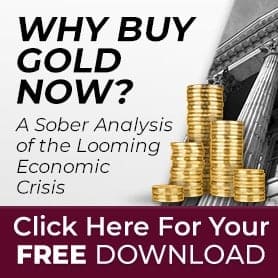- The carnage in global stock and bond markets continues; it really got started last night in Japan
- The JGB (Japanese Government Bonds) dropped for the 3rd consecutive day
- The biggest 3-day drop in bond prices in Japan in over 3 years, so yields surging, along with the Japanese yen
- Of course, this is not supposed to be happening because they’re doing more stimulus and they’ve got negative interest rates, yet the Japanese yen is appreciating anyway
- The Reserve Bank of Australia also came out last night and cut interest rates to 1.5%
- That is an all-time record low
- Why did they do that? Is it because there’s not enough economic growth in Australia?
- Are they trying to revive a slumping property market
- They’ve got a bubble in the real estate market – there’s no valid reason for cutting interest rates from already low levels
- The actual reason that the Reserve Bank of Australia gave for the rate cut was that inflation was not high enough
- It’s about 1%, the way they measure it, and their goal is to have it between 2 and 3%
- In other words, the cost of living is going up by 1% a year and the Reserve Bank of Australia says, “That’s horrible! We need to make sure that things get at least 2-3% more expensive this year and we’re going to slash interest rates to make sure that happens.”
- Of course, when you do that, you have all sorts of risks, and what is the payoff?
- Why is the cost of living going up 2-3% better than it going up 1%?
- What’s wrong with the cost of living not going up at all?
- How about if it actually went down? What if people could actually buy the things they need for less money?
- What’s horrible about the standard of living actually going up?
- Of course, the real risk is, what if inflation goes from 1% (at least the way they measure it) to 4 or 5%?
- Was it worth it? Now you have an inflation problem on your hands
- If you’ve got 1% and you want 2% – You’re close enough!
- Obviously this has got nothing to do with inflation, they’re simply trying to stop the rise in the Australian dollar
- But the Australian dollar went up anyway!
- They’re trying to keep it down because they have this Keynesian world view that a weak currency is good and a strong currency is bad
- But we’ve got to an inflection point where the central banks are losing this battle
- The yen is rising despite the efforts to suppress it
- The Aussie dollar went up, despite efforts to suppress it
- The problem is, the U.S. economy is a disaster
- We got the terrible GDP numbers, and we got a lot of other bad economic news today
- We’ve got a lot more bad news coming out later in the week
- We might get a horrific report on non-farm payrolls
- We got that surprise good number last month, but who knows? We might revise that down and come up with another disappointing number on Friday
- But the Fed, instead of acknowledging this, are still talking about rate hikes
- In fact a Fed official just yesterday said the market should not rule out the possibility of a rate hike in September
- First of all, if the economy comes roaring back (no chance that’s going to happen)
- Even if it comes back, they didn’t say they WOULD raise interest rates, they said they might
- Which also means they might not
- It doesn’t matter what happens to the economy, they can’t raise rates
- The economy is not getting better
- We are either in recession or on the cusp of one
- And the data continues to prove that, but the Fed continues to talk as if they’re thinking about raising rates
- That is part of the problem, because if the market doesn’t believe that the Fed is coming to the rescue…
- I said a long time ago that we could get rallies in the markets, but they are not going to be sustainable
- The Fed is going to have to join the party
- It will have to come to the aid of the markets with new stimulus
- Just delaying rate hikes will not do it
- The Fed has to join the other central banks in providing fresh stimulus, which means they’ve got to cut rates; they’ve got to go back to QE
- Until they acknowledge that, the markets are never going to be able to make much headway
- Of course, all of that is counter-productive to the real economy
- The last thing the real economy needs is more money printing
- But the politicians are never going to allow the real economy to heal because they’re too concerned with financial assets and bubbles and the wealth effect and propping up insolvent governments
Podcast: Download










